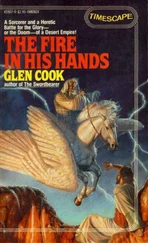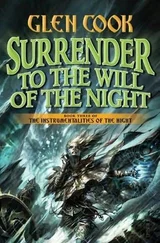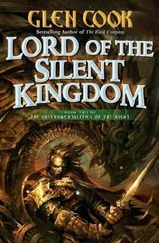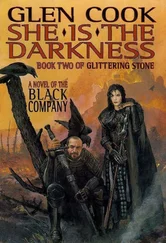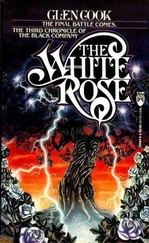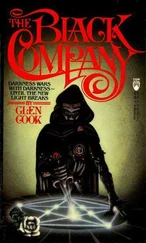Glen Cook - Splinter Of The Mind's Eye
Здесь есть возможность читать онлайн «Glen Cook - Splinter Of The Mind's Eye» весь текст электронной книги совершенно бесплатно (целиком полную версию без сокращений). В некоторых случаях можно слушать аудио, скачать через торрент в формате fb2 и присутствует краткое содержание. Жанр: Фэнтези, на английском языке. Описание произведения, (предисловие) а так же отзывы посетителей доступны на портале библиотеки ЛибКат.
- Название:Splinter Of The Mind's Eye
- Автор:
- Жанр:
- Год:неизвестен
- ISBN:нет данных
- Рейтинг книги:4 / 5. Голосов: 1
-
Избранное:Добавить в избранное
- Отзывы:
-
Ваша оценка:
- 80
- 1
- 2
- 3
- 4
- 5
Splinter Of The Mind's Eye: краткое содержание, описание и аннотация
Предлагаем к чтению аннотацию, описание, краткое содержание или предисловие (зависит от того, что написал сам автор книги «Splinter Of The Mind's Eye»). Если вы не нашли необходимую информацию о книге — напишите в комментариях, мы постараемся отыскать её.
Splinter Of The Mind's Eye — читать онлайн бесплатно полную книгу (весь текст) целиком
Ниже представлен текст книги, разбитый по страницам. Система сохранения места последней прочитанной страницы, позволяет с удобством читать онлайн бесплатно книгу «Splinter Of The Mind's Eye», без необходимости каждый раз заново искать на чём Вы остановились. Поставьте закладку, и сможете в любой момент перейти на страницу, на которой закончили чтение.
Интервал:
Закладка:
Glen Cook
Splinter Of The Mind's Eye
Chapter One
Making of a Messiah
T he caravan crept across a stony wadi and meandered upward into the hills. The camels boredly tramped out their graceless steps, defining the milemarks of their lives. Twelve tired beasts and six weary men made up the small, exhausted caravan.
They were nearing the end of their route. After a rest at El Aquila they would recross the Sahel for more salt.
Nine watchers awaited them.
The camels now carried the sweet dates, emeralds of Jebal al Alf Dhulquarneni, and imperial relics coveted by the traders of Hellin Daimiel. The traders would purchase them with salt recovered from the distant western sea.
An elderly merchant named Sidi al Rhami mastered the caravan. He was captain of a family enterprise. His companions were brothers and cousins and sons. His youngest boy, Micah, just twelve, was making his first transit of the family route.
The watchers didn't care who they were.
Their captain assigned victims. His men stirred uncomfortably in the shimmering heat. The sun's full might blasted down upon them. It was the hottest day in the hottest summer in living memory.
The camels plodded into the deathtrap defile.
The bandits leapt from the rocks. They howled like jackals.
Micah fell instantly, his skull cracked. His ears moaned with the force of the blow. He hardly had time to realize what was happening.
Everywhere the caravan had traveled men had remarked that it was a summer of evil. Never had the sun been so blistering, nor the oases so dry.
It was a summer of evil indeed when men sank to robbing salt merchants. Ancient law and custom decreed them free even of the predations of tax collectors, those bandits legitimized by stealing for the king.
Micah recovered consciousness several hours later. He immediately wished that he had died too. The pain he could endure. He was a child of Hammad al Nakir. The children of the Desert of Death hardened in a fiery furnace.
Plain impotence brought the death wish upon him.
He could not intimidate the vultures. He was too weak. He sat and wept while they and the jackals tore the flesh of his kinsmen and squabbled over delicacies.
Nine men and a camel had perished. The boy was a damned poor bet. His vision doubled and his ears rang whenever he moved. Sometimes he thought he heard voices calling. He ignored everything and stubbornly stumbled toward El Aquila in exhausting little odysseys of a hundred yards.
He kept passing out.
The fifth or sixth time he wakened in a low cave that stank of fox. Pain lanced from temple to temple. He had suffered headaches all his life, but never one as unremitting as this. He moaned. It became a plaintive whine.
"Ah. You're awake. Good. Here. Drink this."
Something that might have been a small, very old man crouched in a deep shadow. A wrinkled hand proffered a tin cup. Its bottom was barely wet with some dark, fragrant liquid.
Micah drained it. Oblivion returned.
Yet he heard a distant voice droning endlessly of faith, God, and the manifest destiny of the children of Hammad al Nakir.
The angel nurtured him for weeks. And droned unceasing litanies of jihad. Sometimes, on moonless nights, he took Micah aboard his winged horse and showed him the wide earth. Argon. Itaskia. Hellin Daimiel. Gog-Ahlan, the fallen. Dunno Scuttari. Necremnos. Throyes. Freyland. Hammad al Nakir itself, the Lesser Kingdoms, and so much more. And the angel repeatedly told him that these lands must again bend the knee to God, as they had done in the day of Empire. God, the eternal, was patient. God was just. God was understanding. And God was distressed by the backsliding of his Chosen. They were no longer bearing the Truth to the nations.
The angel would answer no questions. He merely castigated the children of Hammad al Nakir for having allowed the minions of the Dark One to blunt their will to carry the Truth.
Four centuries before the birth of Micah al Rhami there was a city, Ilkazar, which established dominion over all the west. But its kings were cruel, and too often swayed by the whims of sorcerers interested only in advancing themselves.
An ancient prophecy haunted the wizards of Ilkazar. It declared that the Empire's doom would find it through the agency of a woman. So those grim necromancers persecuted women of Power without mercy.
In the reign of Vilis, the final Emperor, a woman named Smyrena was burned.
She left a son. He persecutors overlooked the child.
That son migrated to Shinsan. He studied with the Tervola and Princes Thaumaturge of the Dread Empire. And then he returned, embittered with the bile of vengeance.
He was a mighty wizard now. He rallied the Empire's foes to his standard. The war was the cruelest that earth remembered. The wizards of Ilkazar were mighty too. The Empire's captains and soldiers were faithful, hardened men. Sorceries stalked the endless nights and devoured nations entire.
The heart of the Empire, then, was rich and fertile. The war left the land a vast, stony plain. The beds of great rivers became channels of lifeless sand. The land earned the name Hammad al Nakir, Desert of Death. The descendants of kings became petty hetmen of tattered bands which perpetrated bloody little butcheries upon one another over mudhole excuses for oases.
One family, the Quesani, established a nominal suzerainty over the desert, bringing an uneasy, oft broken peace. Semi-pacified, the tribes began raising small settlements and refurbishing old shrines.
They were a religious people, the Children of Hammad al Nakir. Only faith that their trials were the will of God gave them the endurance to weather the desert and the savagery of their cousins. Only an unshakable conviction that God would someday relent and restore them to their rightful place among the nations kept them battling.
But the religion of their Imperial forebears was sedentary, a faith for farmers and city dwellers. The theological hierarchies did not fall with the temporal. As generations passed and the Lord did not relent, common folk drifted ever farther from a priesthood unable to shed historical inertia, unable to adapt dogma to the circumstances of a people gone wholly nomadic and grown accustomed to weighing everything in the balance scale of death.
The summer had been the hardest since those immediately following the Fall. Autumn promised no relief. Oases were drying up. Order had begun to evade the grasp of Crown and priesthood. Chaos threatened as desperate men resorted to raid and counterraid and younger priests split with their elders over the meaning of the drought. Undisciplined anger stalked the barren hills and dunes. Dissatisfaction lurked in every shadow.
The land was harkening for the whisper of a new wind. One old man heard a sound. His response would damn and saint him.
Ridyah Imam al Assad's best days were far behind him. He was nearly blind now, after more than fifty years in the priesthood. There was little he could do to serve the Lord any longer. Now the Lord's own must care for him.
Nevertheless, they had given him a sword and set him to guard this slope. He had neither the strength nor the will to employ the weapon. If one of the el Habib came this way, to steal water from the springs and cisterns of Al Ghabha, he would do nothing. He had his weak sight to plead before his superiors.
The old man was true to his faith. He believed that he was but one brother in the Land of Peace and that such good fortune as came his way should be shared with those whom the Lord had called him to guide.
The Al Ghabha Shrine had water. El Aquila had none. He did not understand why his superiors were willing to bare steel to maintain that unnatural balance.
Читать дальшеИнтервал:
Закладка:
Похожие книги на «Splinter Of The Mind's Eye»
Представляем Вашему вниманию похожие книги на «Splinter Of The Mind's Eye» списком для выбора. Мы отобрали схожую по названию и смыслу литературу в надежде предоставить читателям больше вариантов отыскать новые, интересные, ещё непрочитанные произведения.
Обсуждение, отзывы о книге «Splinter Of The Mind's Eye» и просто собственные мнения читателей. Оставьте ваши комментарии, напишите, что Вы думаете о произведении, его смысле или главных героях. Укажите что конкретно понравилось, а что нет, и почему Вы так считаете.


